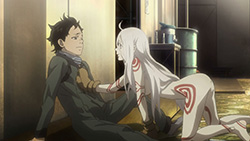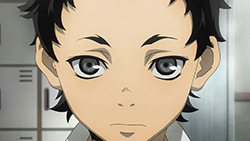Spring 2011’s late-bloomer profile deepens with another under-the-gun entry, this time the eagerly anticipated (be me, anyway) anime adaptation of Jinsei Kataoka and Kazuma Kondou’s excellent manga, Deadman Wonderland. And based on the first episode, it doesn’t disappoint.
There are relatively few manga adaptations the prospect of which gets me really excited. Seeing “Rurouni Kenshin’s” Jinchou arc adapted probably would thrill me more than any anime short of seeing “Moribito” continued. “Future Diary”, “Sand Chronicles”, “Flat”, maybe “Baby Steps”. It’s not a long list – but this manga is definitely on that list. The reasons are many, but first and foremost I love the straightforward, jarring horror of it. There’s not much preamble here – cute young boy is injured while his entire class is brutally murdered by a mysterious “red man” as a familiar, haunting song plays. He’s framed for the murders, convicted, send to a bizarre and sadistic prison-for-profit where inmates are forced to compete to survive for a paying audience’s profit. He’s beaten, kicked, spat on – brutalized in every possible physical and emotional way. And there’s no softening the blow – the manga terrorizes you with this sick reality almost from page one.
 And for the most part, this adaptation from Manglobe gets that pretty much right. Yes, they changed the premise a little to de-emphasize the earthquake that devastated Tokyo 10 years earlier – but that’s understandable. The graphic nature of the slaughter in the classroom is toned down quite a bit, with a lot of shadows and dead air. But it still manages to convey some of the shocking nature of the scene as written. And the irony, of course, is that this grisly moment is only the beginning of the torture for hero Ganta. At first flush there seems nothing unusual about Ganta – he’s just an undersized 14 year-old who plays games with his friend, moons over his best girl friend and when he’s caught up in the deceit that is his “trial”, he reacts as a normal 14 year-old would – he cries. He lashes out, and feels sorry for himself. And when he’s sent to the nightmare that is Deadman Wonderland, he goes dead on the outside.
And for the most part, this adaptation from Manglobe gets that pretty much right. Yes, they changed the premise a little to de-emphasize the earthquake that devastated Tokyo 10 years earlier – but that’s understandable. The graphic nature of the slaughter in the classroom is toned down quite a bit, with a lot of shadows and dead air. But it still manages to convey some of the shocking nature of the scene as written. And the irony, of course, is that this grisly moment is only the beginning of the torture for hero Ganta. At first flush there seems nothing unusual about Ganta – he’s just an undersized 14 year-old who plays games with his friend, moons over his best girl friend and when he’s caught up in the deceit that is his “trial”, he reacts as a normal 14 year-old would – he cries. He lashes out, and feels sorry for himself. And when he’s sent to the nightmare that is Deadman Wonderland, he goes dead on the outside.
You pretty much have to feel sorry for Ganta for this to work, because the central angst of this story is that he’s a true innocent suffering unimaginable pains for something he didn’t do. The casting of Paku Romi is a good call, here – she plays boys better than almost any female seiyuu working today, and she’s able to convey a range of different males at that. There’s a bit too much Edward Elric in her Ganta, but she’ll get the emotional moments – and there are many – right. As for Shiro, the casting of Kana Hanazawa was certainly welcomed. The list of wonderful performances she’s turned in lately is seemingly endless – most prominently of late, of course, her bravura triumph as Kuroneko in Ore no Imouto. I’m concerned by her work in the premiere, though, because her Shiro to me is vocally indistinguishable from her Nessa (Fractale). I hope that changes – beyond the simple distraction it provides, Shiro is a very, very different character than Nessa. The hope here is that her performance will evolve as the series progresses – as good as she’s proved she is, I can hardly think otherwise.
 My only other concern at this point is the fact that this is a 12-episode series. Deadman Wonderland is not going to fit comfortably into 12 episodes, so there will have to be major changes – and neither the director or screenwriter have enough in their resume to convince me that they’re equipped to make them wisely. Manglobe did very well adapting Sarai-ya Goyou to an 11-episode format, but that series had the brilliant Tomomi Mochizuki as both director and screenwriter. This is a big story, and very, very dark – I’m comfortable based on the premiere that they’ll capture that darkness, but it’s a concern whether they’ll capture the scope and scale of the drama that makes the manga great.
My only other concern at this point is the fact that this is a 12-episode series. Deadman Wonderland is not going to fit comfortably into 12 episodes, so there will have to be major changes – and neither the director or screenwriter have enough in their resume to convince me that they’re equipped to make them wisely. Manglobe did very well adapting Sarai-ya Goyou to an 11-episode format, but that series had the brilliant Tomomi Mochizuki as both director and screenwriter. This is a big story, and very, very dark – I’m comfortable based on the premiere that they’ll capture that darkness, but it’s a concern whether they’ll capture the scope and scale of the drama that makes the manga great.
That said, the premiere is good – damn good. And until the staff give me reason to think otherwise, I have to give them the benefit of the doubt.




